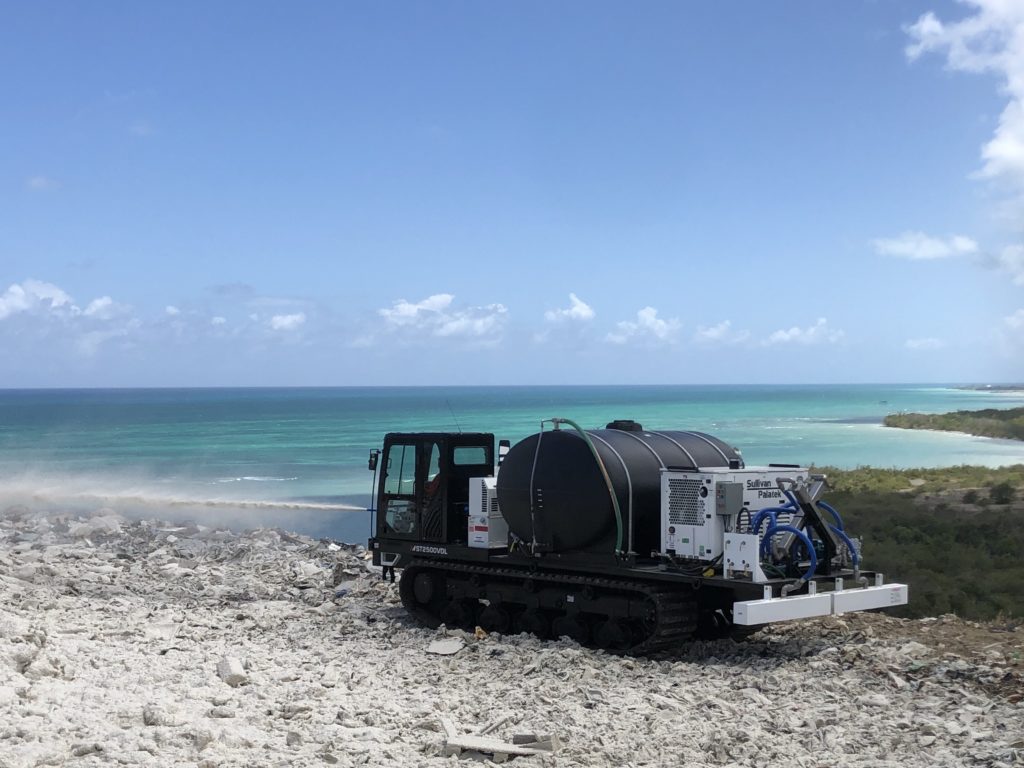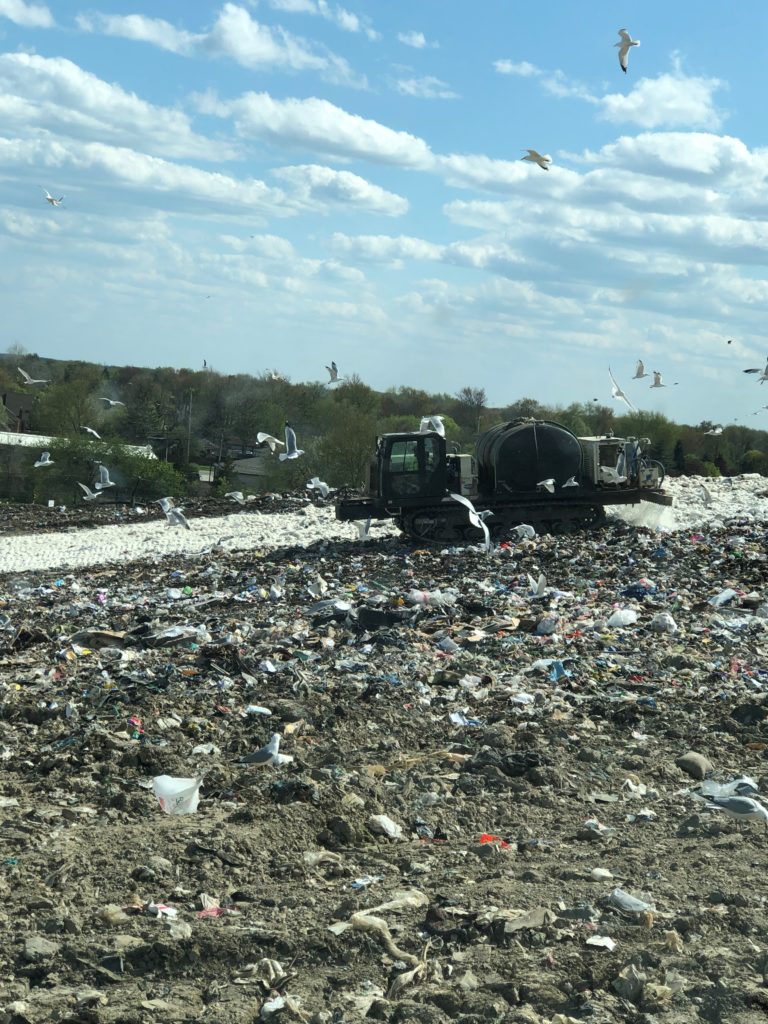The debris left in the wake of Hurricanes Irma and Maria created a swell in the U.S. Virgin Islands’ (USVI) waste stream.
Remnants of buildings and uprooted trees cluttered the roadways, disrupting the lives of some 100,000 residents.
Many abandoned their vehicles and homes. The damages were irreversible.
In total, 72 miles of refuse needed to be disposed of — a logistical nightmare for a territory with finite resources.
“We’re running into the problem of space,” said Alice Krall, communications manager for the Virgin Islands Waste Management Authority (VIWMA). “The problem is trash being generated at amazing speed. We move it and it springs right back up.”
As dumps overflowed with mountains of debris, federal and local agencies scrambled to find neighboring countries with open capacity.
The longer the task force took to transfer refuse, the more hazardous stationary piles became.
It was the recipe for a severe environmental and public health crisis.
Changing the tide
Tropical storms weren’t the first to highlight the waste management system’s shortcomings.
Although the VIWMA’s working relationship with the EPA is improving, the underdeveloped Anguilla and Bovoni sites have been unsatisfactory for years. This is mainly because landfill surfaces are routinely left exposed, resulting in:
- Long spells of fire
- Littering scavengers
- Pervasive foul odors
- Other wind-borne materials
In recent years, however, the director of the VIWMA clamped down on the non-compliant dumps. The waste management team began sorting refuse, separating metals and instituting tipping fees. Compost and recycling programs are underway, too.
The director also saw a need for alternative daily cover. After consulting a group of engineers to adopt better practices and control environmental/public hazards, they recommended Atmos Cover ADC — a foam application that contains and protects residents from the dumps’ contents.

Slashing monthly soil expenditure by 83%
The logistics of importing good soil (compounded by scarcity) make it an expensive commodity.
Soil used in daily cover comes from pits outside of the islands. How well the soil controls fires, malodors and scavengers largely depends on its properties. These vary and aren’t always surefire.
The cost of securing high-quality soil falls anywhere between $150,000 and $200,000 a month.
Realizing this expense couldn’t be sustained, the director requested a consultation with Atmos to decrease reliance on traditional soil cover and loosen budget constraints.
Within a week, an Atmos technician was in the Virgin Islands to conduct a pre-site assessment. A custom-tailored solution that aligned with the VIWMA’s budget and goals followed.
Today, a Morooka-based Pneumatic Foam Unit (PFU) 2500 applies a layer of water-based foam at the Anguilla and Bovoni dumpsites.
The process takes one operator half an hour and, since 6 inches of daily soil cover is no longer needed, makes better use of the space. Of course, there were other challenges: The Caribbean environment poses year-round threats to landfill operations.

Taming landfill fires and unwelcome visitors
When pockets of methane meet rich oxygen concentrations under the Caribbean sun, underground fires occur. If untreated, parts of the landfill could cave in.
A subsurface cavity may be lethal. Landslides could shift heavy mounds of trash over the perimeter and crush passersby.
Personnel needs to know what lies underneath at all times to ensure safety.
The scrap metal sections contain another hazard. Fires originating from improperly disposed of cars — still containing batteries and flammable fuels — can take weeks to extinguish.
The director made controlling these spells of fire a priority and wrote Atmos’ foam solution into their fire plan. While the solution doesn’t contain every chemical found in common extinguishers — it certainly can suppress smoke emanating from hot spots.
It’s the first step in smothering fires, ultimately stopping toxic gasses from entering the public sphere.
The bird problem at St. Croix’s main airport
Hundreds of seabirds routinely swept into the dumps and scattered their meals abroad — dropping refuse into residential and municipal areas below.
Homes and businesses were covered in trash. The dumps already had a weak reputation among residents and not being able to control the scavengers only made things worse.
The larger problem? Aircraft safety.
The Anguilla landfill is situated beside a major airport runway. Too many birds in the air cause flight delays and, in severe cases, shutdowns.
The VIWMA expressed these concerns. Atmos’ field-proven alternative daily cover delivered.
The foam mixture naturally repels water, creating a 24-hour seal over landfill surfaces. It neutralizes and locks-in odors, redirecting all kinds of animals in the process.
But designing the VIWMA’s application required a unique detail. The on-site, chemical storage tank had to resist the force of a hurricane.
Securing alternative daily cover in tricky environments
One of the benefits of working with Atmos is receiving all application equipment at no charge (customers only purchase foam supplies as needed).
Some equipment, however, needs to be built from scratch to meet site requirements.
For the VIWMA, that meant repurposing a cargo container into a hurricane-proof Bulk Storage & Dilution System (BSD-7000) and bolting it down to concrete to withstand strong winds.
The custom-built storage unit would also serve as a stockroom with parts and tools to service the vehicle applicator.
Next, Atmos technicians trained the VIWMA on how to use all application equipment.
Other environmental solutions companies might see a disadvantage in partnering with an isolated chain of islands. The geographic positioning could make the area harder to reach, making poor service easy to blame on the provider.
Atmos sees opportunity.
The next chapter
The director of the VIWMA wants to rebuild its island-wide, reputable name.
Recently, she greenlit an odor misting system around the Anguilla landfill, which aims to contain foul odors and amend the agency’s relationship with the bordering airport.
If you believe Atmos products and equipment could boost your environmental remediation plan or waste management system, let’s talk today.



